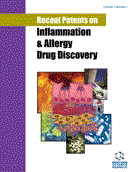Abstract
One of the growth factors that appear to play a crucial role in the pathogenesis of systemic sclerosis is TGF-β. The three functionally and structurally similar human isoforms of TGF-β play important roles in embryonic development, in the regulation of tissue repair following injury and in immune responses. Systemic sclerosis fibroblasts express increased levels of TGF-β receptors on their surface which in turn results in increased signalimg of TGF-β induced collagen gene expression. Some of the patents and intricate pathways that mediate the stimulation of collagen gene expression by TGF-β have recently been described and a potential inhibition of these pathways may lead to novel therapeutic targets for systemic sclerosis.
Keywords: Systemic sclerosis, scleroderma, fibrosis, transforming growth factor-beta
 4
4


















